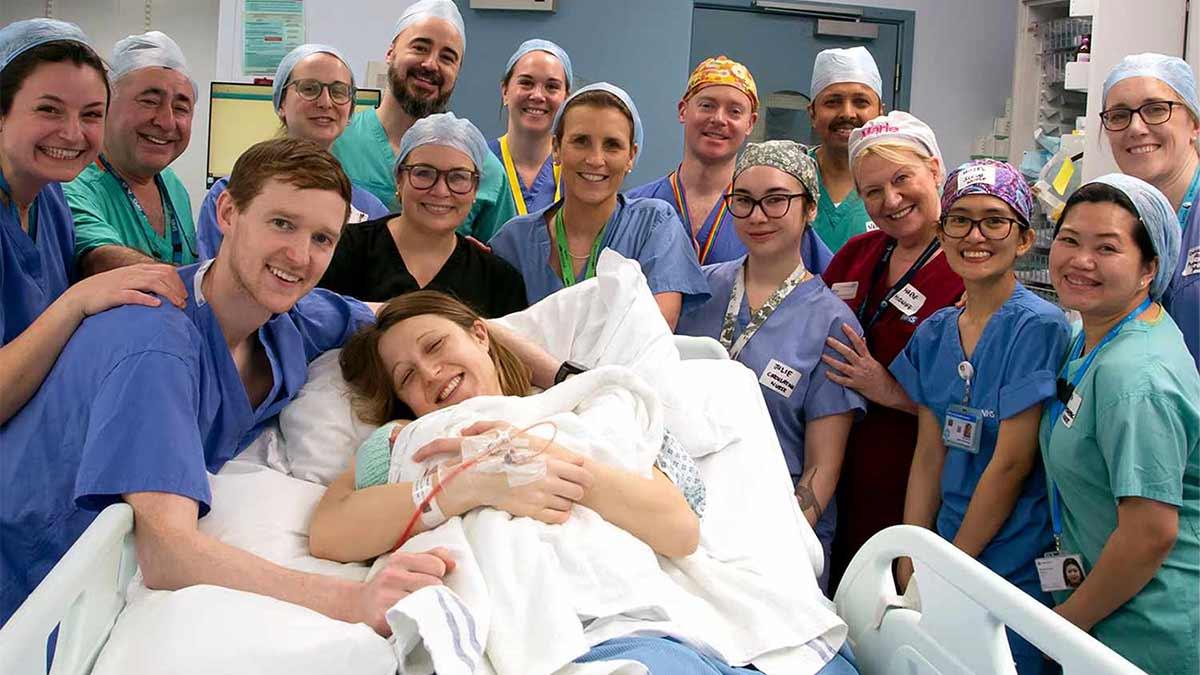A baby girl, described as a “miracle” by her parents, has made medical history by becoming the first child in the UK born to a mother with a transplanted womb.
Grace Davidson, 36, had not been able to become pregnant because she was born without a working uterus. But in 2023, everything changed when she was given a womb from her sister in what was then the UK's first successful transplant of its type. Two years on, in February, Grace gave birth to her daughter — a historic moment not only for her family, but for British medicine.
The child has been named Amy, in honor of Grace's sister and donor, Amy Purdie. Weighing a little over two kilograms (4.5 pounds), baby Amy's birth was the culmination of years of medical and emotional toil.
Looking back on the moment she first held her daughter in her arms, Grace said the experience was both "incredible" and "surreal.
"It was really overwhelming because we'd never actually allowed ourselves to think about what it would be like for her to be here," she said. "It was really wonderful."
The couple, who live in North London and are originally from Scotland, are now optimistic about having more children, hoping for a second child using the same transplanted womb.
At first, Grace and her husband Angus, 37, had opted to keep their story under wraps. But after Amy was delivered safely, the couple agreed to make their experience known to the BBC, calling their daughter their "little miracle."
The medical team involved since Grace's pioneering surgery have gone on to conduct three further womb transplants with organs from deceased donors. They plan to carry out a total of 15 transplants as part of an ongoing clinical trial.
Grace was diagnosed with Mayer-Rokitansky-Küster-Hauser (MRKH) syndrome, a disorder where the uterus is underdeveloped or missing altogether, but not the ovaries. When the BBC initially covered her story in 2018, Grace had hoped that her mother might be an ideal donor. Sadly, her mother's uterus was not suitable.
By 2019, one of Grace's two sisters, Amy — who had two children already and wasn't going to have any more — was being considered for donation. After psychological counseling, both sisters were readied for the surgery. Grace and Angus also received fertility treatment, and a number of embryos were frozen. Surrogacy and adoption were possibilities, but Grace longed to feel pregnant herself.
"I've always had a mothering instinct," she said. "But for years I had suppressed it because it was too painful to go there."
The first successful birth after a womb transplant occurred in Sweden in 2014. Since then, more than 135 transplants have been done in at least a dozen countries, resulting in around 65 births in total.
Although Grace’s transplant was originally scheduled for late 2019, the operation was delayed multiple times, including during the COVID-19 pandemic. It finally went ahead in February 2023 at the Churchill Hospital in Oxford. The complex procedure involved over 30 medical professionals and lasted 17 hours — from removing Amy’s womb to implanting it in Grace.
Surgeon Isabel Quiroga, who directed the transplant, admitted the dangers but stressed the importance of the surgery: it was both "life-enhancing and life-creating — and you can't have better than that."
Amy explained that, unlike other women who feel a loss after undergoing a hysterectomy, she felt no loss due to the direct and dramatic effect on her sister's life. Grace had her period two weeks after surgery and got pregnant after the first IVF.
Feeling her baby kick for the first time was "incredible," Grace described, stating that each second of her pregnancy was "really special."
On February 27, Grace gave birth to Amy by Caesarean section at Queen Charlotte's Hospital in West London.
"It was a moment of pure joy," said surgeon Isabel Quiroga, describing the birth.
With their first child now arrived, Grace and Angus are thinking about having more. They plan to try for their second baby as soon as they get the medical go-ahead. Then, Grace will have surgery to have the donated womb removed, eliminating the necessity of daily immunosuppressant drugs, which she now takes to avoid organ rejection. Taking these drugs long-term can increase the risk of getting certain cancers — but Quiroga says those risks fall back to baseline when the medication is discontinued.
Professor Richard Smith of Imperial College Healthcare, the leader of the team to remove the organ, has been researching womb transplantation for over 20 years. He said the birth was an emotional experience.
"I'm not usually at a loss for words but when the baby emerged I was lost for words — there were a lot of tears in the theatre that day," he said to the BBC.
"Everything is remarkable and very emotive," he said.
In the opinion of Prof. Smith, Amy's birth is hope for about 15,000 women in the UK of childbearing age who lack a functioning uterus — about 5,000 of whom were born without one.
Prof. Smith is the director of Womb Transplant UK, the charity that paid for Grace's operation. All the NHS staff who were involved gave their time for free. He stated that the charity now has sufficient funds to pay for two more transplants, with about 10 women already in the pipeline — either with embryos stored or receiving fertility treatment, which are requirements for eligibility.
The trial is permitting a maximum of 15 womb transplants — five from living donors and ten from deceased donors. Though three women have already received deceased-donor wombs, their identities are kept secret. NHS Blood and Transplant confirmed that donor families in such exceptional situations need special consent.
Angus, the father of baby Amy, says words cannot be strong enough to describe how thankful he is to his sister-in-law.
It was an "absolute no brainer" to call their daughter Amy, he said. Her middle name, Isabel, is a tribute to the chief surgeon.
For Grace, the whole thing has made her even closer to her sister.
"It was so hard to let her do that for me," she said. "It's such a big sisterly act."
Read also| Tamannaah Bhatia: Fashion is a Powerful Expression of My Emotions
Read also| Watch| Malaika Arora Shares Her 5-Step Hair Tying Routine


















